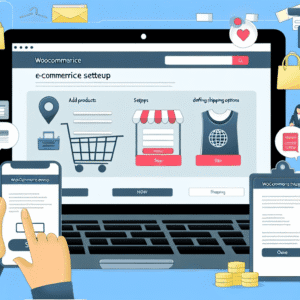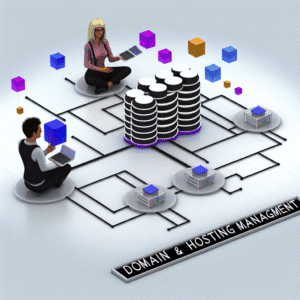In today’s hyper-connected world, digital marketing has emerged as a critical element for business success. With the swift evolution of technology and consumer behavior, understanding how to leverage digital channels effectively is essential for any business aiming to thrive. But what exactly makes digital marketing so powerful? Let’s delve into its various components and uncover the secrets that can drive your business to success.
The Digital Landscape: A New Era of Marketing
Gone are the days when businesses relied solely on traditional marketing methods such as print advertising or television commercials. The digital landscape offers a myriad of channels, including social media, email, search engines, and websites, allowing businesses to reach their audiences where they spend most of their time—online.
Digital marketing enables precise targeting, ensuring that messages reach the right people at the right time. This level of customization drives engagement, as consumers respond to marketing efforts that resonate with their needs and interests.
Key Components of Digital Marketing
Understanding the various components of digital marketing is vital. Each element plays a significant role in enhancing brand visibility, engagement, and conversion rates. Let’s explore some core components.
1. Search Engine Optimization (SEO)
SEO involves optimizing a website to rank higher on search engine results pages (SERPs). When potential customers search for products or services, they often gravitate towards the first few results. By employing effective SEO strategies, businesses increase their chances of appearing at the top of these results, driving organic traffic and enhancing visibility.
2. Content Marketing
Content is at the heart of digital marketing. High-quality content tailored to specific audiences can educate, engage, and prompt action. Blogs, videos, infographics, and whitepapers are some of the ways businesses can share valuable information. Consistent content creation not only boosts SEO efforts but also builds brand authority and fosters customer loyalty.
3. Social Media Marketing
Social media platforms such as Facebook, Instagram, Twitter, and LinkedIn have transformed how brands connect with their audiences. By sharing engaging content, running targeted ad campaigns, and interacting with followers, businesses can cultivate a community, foster brand loyalty, and ultimately drive sales.
4. Email Marketing
Despite the rise of social media, email marketing remains one of the most effective channels for nurturing leads. By segmenting audiences and crafting personalized messages, businesses can keep their customers informed and engaged. Email campaigns can feature promotions, newsletters, product launches, or even personalized recommendations tailored to individual customers.
5. Pay-Per-Click (PPC) Advertising
PPC advertising allows businesses to display ads on search engines and social media. Advertisers only pay when a user clicks on their ad, ensuring that marketing dollars are spent efficiently. This method provides immediate visibility and can be targeted based on demographics, interests, and behaviors, offering a strong return on investment.
The Benefits of Digital Marketing
Now that we have a clearer understanding of the various components, let’s discuss the key benefits that digital marketing provides for businesses.
1. Cost-Effectiveness
Digital marketing often offers a higher return on investment (ROI) compared to traditional marketing methods. With various options available for different budgets, businesses can tailor their strategies to meet specific financial goals without sacrificing reach.
2. Increased Engagement
Through interactive content like polls, quizzes, and live videos, businesses can foster active engagement with their audience. This interaction not only helps in building relationships but also provides valuable insights into consumer preferences.
3. Data-Driven Insights
Digital marketing allows businesses to collect data on customer behavior and preferences. Tools like Google Analytics enable companies to track website traffic, user demographics, and campaign performance. This data is invaluable for refining strategies and making informed decisions.
4. Broader Reach
With a global online audience, businesses can easily expand their reach, even to international markets. By breaking geographical barriers, digital marketing offers unprecedented opportunities for growth.
5. Improved Conversion Rates
Digital marketing strategies are designed to guide consumers through the buying process effectively. From raising awareness to nurturing leads and encouraging conversions, optimized digital marketing can significantly enhance sales performance.
Strategies for Successful Digital Marketing
Developing a successful digital marketing strategy requires careful planning and execution. Here are some strategies to consider:
1. Define Clear Objectives
Before embarking on any digital marketing effort, it’s essential to define clear, measurable objectives. Whether it’s increasing website traffic, generating leads, or boosting sales, having specific goals helps in crafting focused strategies.
2. Know Your Audience
Understanding your target audience is key to tailoring your marketing messages. Conduct thorough market research to identify customer demographics, preferences, and pain points. This insight will inform content creation and ad targeting.
3. Optimize for Mobile
With the increasing use of smartphones, ensuring that all digital marketing materials are mobile-friendly is crucial. A responsive design not only improves user experience but also positively impacts search engine rankings.
4. Leverage Social Proof
Testimonials, reviews, and case studies can significantly influence potential customers. Highlighting positive experiences from previous customers builds credibility and encourages new ones to make a purchase.
5. Continuously Monitor and Improve
Digital marketing is not a one-time effort but an ongoing process. Regularly analyze campaign performance, customer feedback, and market trends. This data will allow businesses to adapt their strategies proactively.
Conclusion
In summary, digital marketing is more than just a trend; it’s a fundamental aspect of modern business strategy. By unlocking the secrets of digital marketing, businesses can tap into the vast potential of the online marketplace. The ability to engage with customers personally, gather actionable data, and refine strategies creatively positions businesses for sustainable success.
FAQs
1. What is digital marketing?
Digital marketing encompasses all marketing efforts that use the internet or electronic devices to connect with potential customers. This includes SEO, content marketing, social media, email marketing, and PPC advertising.
2. Why is digital marketing important for businesses?
Digital marketing is crucial because it enables businesses to reach larger audiences, engage with them meaningfully, and track campaign performance using data.
3. How do I start with digital marketing?
Begin by defining your objectives and understanding your target audience. Develop a cohesive strategy that integrates various digital marketing channels and continuously analyze performance to optimize efforts.
4. How much should I invest in digital marketing?
Investing in digital marketing varies depending on your business size, industry, and goals. It’s advisable to allocate a budget that aligns with your objectives while testing different methods to find what works best.
5. What are the best platforms for digital marketing?
The best platforms depend on your target audience. Popular platforms include Google, Facebook, Instagram, LinkedIn, and email for various types of outreach and engagement.






